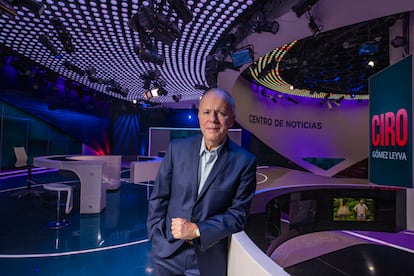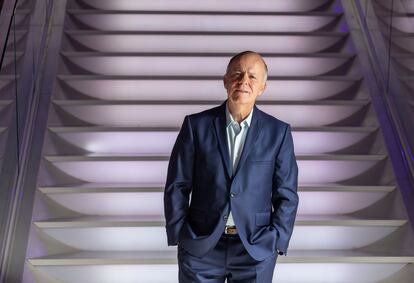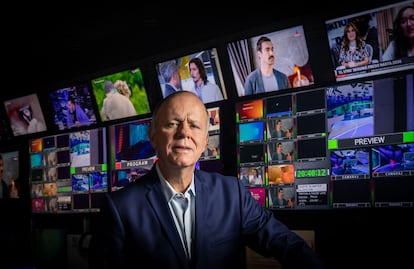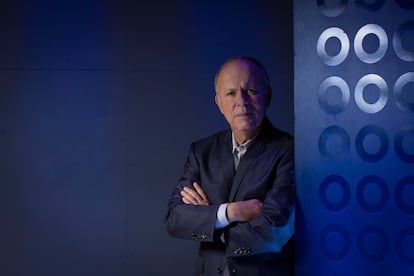Ciro Gómez Leyva: ‘Saying that the power wants to kill you is very profitable and tempting, but today I have no data to confirm it’
The Mexican journalist talks about his assassination attempt, the chaos of the moment, the six months that have passed, the president’s attacks and the stagnation of the investigation: ‘Someone tried to kill me. I don’t know who, I don’t know why’


It was a fast and confusing 12 seconds. It was 11.10pm on Thursday, December 15, and Ciro Gómez Leyva was driving back home. Half of Mexico had just seen him, like they did every day from Monday to Friday, presenting the news of the day on Imagen Televisión. There was some traffic on Tecoyotitla street. It was the week before Christmas, a time of company dinners and last minute shopping. He seems to remember trying to pass a car that was obstructing him. Then he heard some bangs. After that, things happened quickly; by the time he realized he was being shot at, they were already upon him. Two people on a motorcycle sped up and got in front of him. One of them twisted his body. That is the image that became imprinted in the journalist’s mind: a man turning to face him, pointing a gun at his head as the motorcycle jerked. Also, a lot of light. A blaze of pastels, white, blue, orange. The motorcycle got under a lamppost. Bang, bang, bang, bang – nine gunshots were embedded in the truck’s armored glass, body and tires. The motorcycle stumbled.
“It zigzagged and left at a speed that to me seemed like the special effects of the early Star Wars movies. Do you remember how the spaceships disappeared into a vanishing point?”
This is how Gómez Leyva describes it six months after the fact. That night, one of the most popular journalists in the country suffered an attack some 650 feet from his home in the south of Mexico City. Now, one June afternoon, Gómez Leyva talks about it in a quiet, calm, serene voice, sitting in his office at the Imagen Televisión newsroom, shortly before the evening newscast.
“Someone tried to kill me. I don’t know who, I don’t know why. And I was lucky that night.”
When he became aware that the second passenger on the motorcycle was shooting at him, Gómez Leyva ducked. “I lifted my head. I saw the shooters one more time at an angle of almost 45 degrees and then ducked again. It was a reflex action, a basic survival instinct.”

Moments later, the motorcycle had disappeared down the street and he had survived the shots without a scratch. He stopped the car and took out his phone to call for help, but his hands were shaking. “It was chaos, but I touched myself and noticed that I wasn’t hurt. There was no blood.” He did not go home. He remembered that Manlio Fabio Beltrones, a politician from the Institutional Revolutionary Party (PRI) and an old friend, lived in a nearby gated street with private security. That is where he went. “When I entered the gated street, I knew I was safe.” Not even three minutes had passed since the attack.
Four hours of chaos
Beltrones received him at home. Together they called Omar García Harfuch, Mexico City’s chief of police and another attack survivor. At 11.33pm, Gómez Leyva spoke to his press officer and asked him to tweet: “At 11.10pm, 200 meters from my house, two people on a motorcycle shot at me, apparently with the clear intention to kill me. I was saved by the armor of my truck which I was driving, and I have reported the matter to the authorities. CGL.” He still has not forgiven himself for it being poorly written. Excellence cannot be neglected, not even the night in which some guy shoots you from a motorcycle.
The message was like a wildfire. It went viral in a matter of minutes, causing a stir on social media, newspaper newsrooms and the public conversation. Meanwhile, police officers, people close to the journalist, members of the press and representatives of all the prosecutor’s offices of the city – bickering over under whose jurisdiction the crime fell – began to arrive at Beltrones’ house. They were chaotic moments in which Gómez Leyva operated by some sort of inertia. He compares it to managing a piece of breaking news:
“Newsrooms are like hospital emergency rooms, or a soccer team. Like a military squad. You have to make quick decisions, often contradictory, difficult, with little information. I was aware of what was going on. And at the same time, you know, I looked at the phone and saw the hashtags, the impact that this had caused. I didn’t know why it was against me, I didn’t know what was coming. I thought: ‘If this comes from the world of politics – which I doubt – then it’s going to be impossible to prove.’”
Gómez Leyva does not want to talk much about those hours: he says that he is keeping the exclusive because he is writing a book, or a script, which he hopes to finish by 2025. He finally went home at 4.00am. “I left work, like every night. I had a box of cookies that the staff had given me as part of the holiday gift exchanges. But I got home with an army.” At 7.00am, despite his friends’ recommendations to take the day off, he was on the radio like every morning.

“Three people who understand what public life is, who understand what communication is, told me: ‘Go home and rest. You are going to be very upset, you have no idea how you’re going to crash.’ I told them: ‘Impossible. I have a very good story to tell, I have it quite well documented, better than anyone, in the very first person. And why am I going to give in to the cruelty, the malice, of those who were already making things up? If there is a show in my life that I cannot miss, it is the one that begins in three hours.’ For me it was a very simple decision; it was a journalist’s decision.”
Life goes on
As for what was crossing his mind at the time, Gómez Leyva says: “I am a journalist who for 35 years has worked on the difficult issues of Mexico’s public life. I was a street reporter in difficult situations for many years. When I was the editorial director of Milenio Televisión, we had to chronicle the war on crime every day. They have killed and kidnapped our reporters; we have been threatened, extorted, beat up. But no one had shot at my head. What is truly new is that they tried to kill me. In such a violent and dangerous country where it is so easy to murder, someone made the decision to do it to me.
“What was going through my head? In the hours and days that followed, an enormous sadness. I wasn’t angry. I wasn’t afraid, either. It was a feeling of great sadness that lasted for a long time. An empathy for all the people who are killed in their villages, only for the assassins to go all over their communities the next day, arrogant, threatening them again. But I also realized, from the first moment, that I had been privileged to experience an episode like this and come out not only alive, but unharmed. The next day something unexpected also came: a practically unanimous display of affection, solidarity and support.”
These past six months have been of reflection for the journalist. “I am 65 years old,” he says. “I told my loved ones: ‘I will probably never go through a situation that exceeds this one, ever.’ And I will probably never go through a situation as fortuitous as this one again. In a way, my life ended that night. And it ended well: healthy, working, active. I want, from that moment on, to give myself and others a good epilogue of life, whatever time I get between the attack and decrepitude. After the [2024 presidential] elections, I expect an absolute transformation of my professional life.”
Some things, however, have changed. Gómez Leyva is learning to live with a bodyguard that follows him everywhere, to notify every move he makes, to not being able to go to the usual places. “You lose practically all privacy, or at least the privacy that you used to know.” It helps that his two children are older and he lives alone. The psychological side effects are also present, like the post-traumatic stress that he handled with the help of a therapist. Still, he refuses to see himself as a victim. “If you have seen relatives, children, mothers, the partners of your colleagues, kidnapped or murdered, are you going live in a professional, existential victimization...? Life goes on, and we are in a privileged position in a brutal country.”
The journalist and the president
One day before the attack, President Andrés Manuel López Obrador (AMLO) had said that listening to journalists Sergio Sarmiento, Carlos Loret de Mola and Ciro Gómez Leyva is “harmful to your health” and can cause “a tumor in the brain.” That was not the first time — nor has it been the last — that the president discredited Gómez Leyva in the daily morning press conference in which he sets the political agenda and attacks his adversaries. “That was an awful coincidence for him, and he was the first to pay. The hashtag #AMLOAsesino (AMLO murderer) led the trends for a long time.”
Gómez Leyva has avoided confrontation with the president. In the hours that followed the attack, his phone did not stop ringing: “You have no idea how many people wrote me and pushed me to accuse López Obrador. Saying that the power wants to kill you is very profitable and very tempting, but today I have no data to confirm it. I do have hundreds of data to say that this power has tried to intimidate me, it has tried to minimize me, it has tried to discredit me. But I cannot hold them responsible [for the assassination attempt]. Nor do I exempt them from any guilt. I just can’t prove it,” he states.

López Obrador was back at it three days later, again in his press conference, where he declared that the attack against the news anchor could have been part of a larger plot to destabilize his government. A way of capitalizing on the attack after the unfortunate statements that outraged a large part of the public opinion. The president’s animosity towards Gómez Leyva had begun in the summer of 2006, when he assured — he still does — that Felipe Calderón stole the presidential elections from him, something that the journalist denied in his articles.
“At that time, I became part of the sinister conspiracy of corrupting forces, which I never left. He hasn’t given me a moment’s peace since he came to power.” Gómez Leyva says that he has suffered “a brutal audit,” ordered by the government, from which he emerged unscathed “after many problems.” He also denounces the “incessant harassment” of the daily press conference. “A number of insults, lies, accusations. I think they didn’t have much information, and still don’t, about what happened. His discourse was full of nonsense, because on one hand he said that he respected me, that I was being protected and that I was not alone. And with the next sentence he would spit in my face. I saw the man become unhinged. When he has talked about you with contempt 300 or 400 times, the blows start to hurt less,” he says. However, he claims that the attacks he makes on Mexican journalists from his position of power in the most lethal country for the press are “criminally irresponsible.”
Six months later, the investigation seems to have stalled. No one claimed responsibility for the attack, no more threats arrived and no clues point to a cartel, a businessman harmed by his reporting or a corrupt politician. Those who perpetrated the crime were arrested: 16 people were detained and 12 are subject to legal proceedings. But nothing is known about the masterminds. Gómez Leyva has a thousand theories and speculations about what could have happened that night and why him; but for now, the facts do not support any of them. In the meantime, life goes on between newsrooms and breaking news. The epilogue of the journalist who survived.
Sign up for our weekly newsletter to get more English-language news coverage from EL PAÍS USA Edition
Tu suscripción se está usando en otro dispositivo
¿Quieres añadir otro usuario a tu suscripción?
Si continúas leyendo en este dispositivo, no se podrá leer en el otro.
FlechaTu suscripción se está usando en otro dispositivo y solo puedes acceder a EL PAÍS desde un dispositivo a la vez.
Si quieres compartir tu cuenta, cambia tu suscripción a la modalidad Premium, así podrás añadir otro usuario. Cada uno accederá con su propia cuenta de email, lo que os permitirá personalizar vuestra experiencia en EL PAÍS.
¿Tienes una suscripción de empresa? Accede aquí para contratar más cuentas.
En el caso de no saber quién está usando tu cuenta, te recomendamos cambiar tu contraseña aquí.
Si decides continuar compartiendo tu cuenta, este mensaje se mostrará en tu dispositivo y en el de la otra persona que está usando tu cuenta de forma indefinida, afectando a tu experiencia de lectura. Puedes consultar aquí los términos y condiciones de la suscripción digital.








































